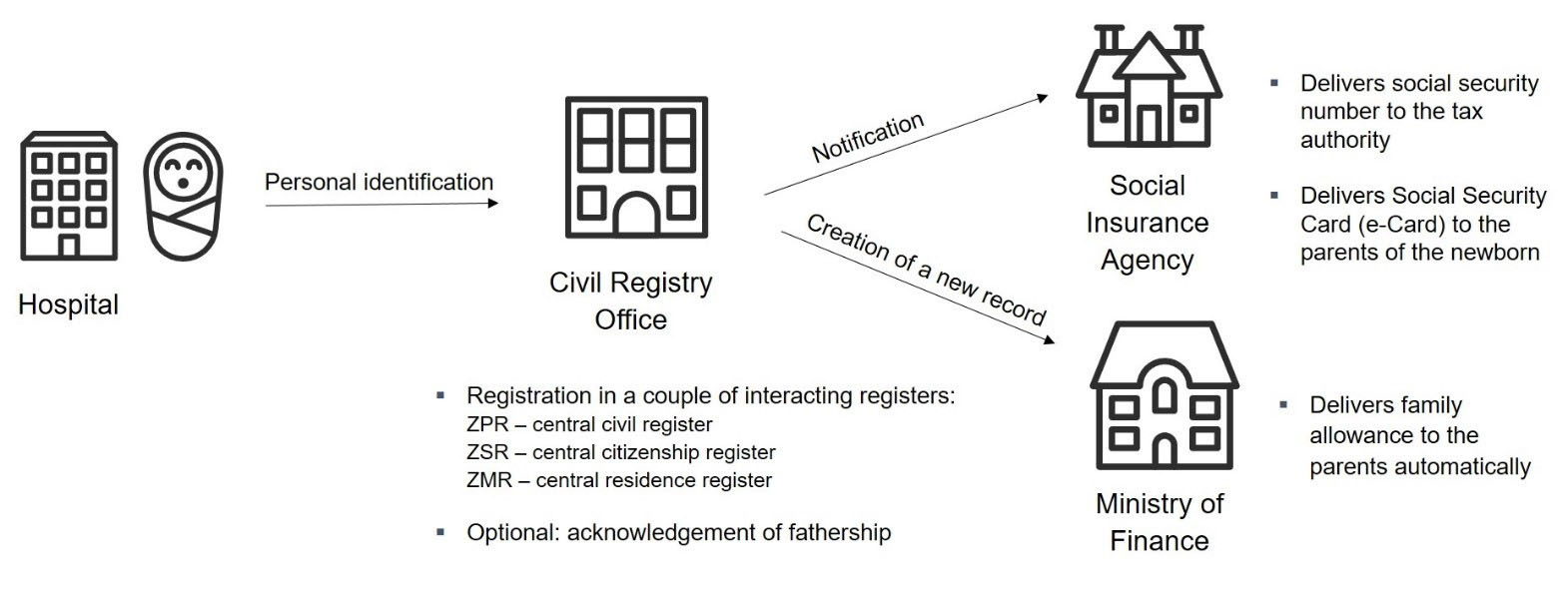General Information
Cases/Enablers
OOP Case
Appetizer
Automatic Family Allowances without Application (ALF) is a no-stop-shop solution for parents with which family allowances for new-born children are paid out automatically. Filling in forms or a visiting the tax office is no longer necessary.
OOP aspect
The parents of the newborn child have to go only once to the civil registry office in order to register the baby as well as get the family allowance (as long as all informations are available) automatically.
OOP synonym
One-Stop-Shop; No-Stop-Shop
Short summary
In the once-only process the public services are integrated so that the parents have to visit only the civil registry office and have to bring along (in a standard-case) no evidences except their personal identification (passport or personal ID card). In some cases (for example in larger local authorities), registry offices have even subsidiaries in hospitals so that the parents can do the whole procedure in the hospital. The data of the citizens are stored in a couple of interacting registers, such as, central civil register (ZPR), central citizenship register (ZSR) and central residence register (ZMR), where the government, in permission of the citizens, are allowed to use them. The Civil Registry Office forwards the parents‘ and child’s data to the social insureance and tax authority and these agencies deliver their respective services to the parents automatically.
Focus
Citizens
Start date
Domain
Social matter
Scope
National/Federal
Country
Austria
Nature and status of project
Rolled Out
Is the OOP case/enabler mandatory?
Mandatory
ENABLING ASSETS OR COMPONENTS
Legal interoperability
The Austrian Act for family benefits 1967, https://www.ris.bka.gv.at/Dokumente/BgblAuth/BGBLA_2015_I_50/BGBLA_2015_I_50.pdf
Technical interoperability
An access to the social insurance agency to deliver the social insurance number for newborns as well as an access to the civil register for an aoutomatic notive of newborns entitled for benefit was necessary.
Data quality
Fraud prevention through automatic proof of entitlement on basis of validated data (registers).
Public administrations get better quality of data through single data collection (civil register).
Public administrations get better quality of data through single data collection (civil register).
DATA HANDLING / DATA EXCHANGE
Type of data sharing
Other (Please specify above)
Data handler
Stakeholder name
Parents
Stakeholder category
Citizen
Stakeholder Role
Data provider
Kind of data
Personal data
Stakeholder name
Hospital
Stakeholder category
NGO
Stakeholder Role
Data consumer
Kind of data
Personal data
Stakeholder name
Civil registry office
Stakeholder category
Government
Stakeholder Role
Data consumer
Kind of data
Personal data
Stakeholder name
Social insurance
Stakeholder category
Government
Stakeholder Role
Data consumer
Kind of data
Personal data
Stakeholder name
Tax authority
Stakeholder category
Government
Stakeholder Role
Data consumer
Kind of data
Personal data
Further stakeholders
The Federal Ministry of the Interior maintains the interacting registers (ZMR - Central residence register, ZPR - Central civil register). The local authorities are responsible fo the central residence register. The Federal Ministry of Families and Youth Affairs is responsible for the legal aspects of the family allowance and provides the rule catalogue for the acknowledgement of the family allowance.
Architecture
The hospital indicates the birth of a child to the Civil Registry Office or one of the parents visits only the Civil Registry Office. The Civil Registry Office delivers a notification to the Social Insurance. The Social Insurance provides then the Social Security number to the Tax Authority and the Social Security Card (e-card) to the parents of the newborn. The Tax Authority delivers the family allowance to the parents.
Image upload

Benefits for involved actors
The benefits for the parents are:
• reducing administrative burden since they do not need to provide evidences as the Civil Registry Office has anyway through the access to the registers.
• Procedures are simplified, less cumbersome and more convenient, since the Civil Registry Office forwards the parents' and child's data to the social insurance and tax authority and these agencies deliver their respective services to the parents automatically
• higher satisfaction of parents since they receive the family allowance through proactive service provisioning (non-stop-service)
Benefits of the once-only principle implementation for public administrations are:
• increased efficiency and effectiveness of public administration through co-creation and collaboration between administrations by opening up and sharing and re-using knowledge and resources -> citizens have less burden, simpler processes and receive faster service through the re-use of existing data across public administration
• sharing and re-using of data enables legal obligations to be fulfilled faster
• public administrations can retrieve the data from the sources where these data are approved and quality-assured
• governments receive better quality of data
• reducing administrative burden since they do not need to provide evidences as the Civil Registry Office has anyway through the access to the registers.
• Procedures are simplified, less cumbersome and more convenient, since the Civil Registry Office forwards the parents' and child's data to the social insurance and tax authority and these agencies deliver their respective services to the parents automatically
• higher satisfaction of parents since they receive the family allowance through proactive service provisioning (non-stop-service)
Benefits of the once-only principle implementation for public administrations are:
• increased efficiency and effectiveness of public administration through co-creation and collaboration between administrations by opening up and sharing and re-using knowledge and resources -> citizens have less burden, simpler processes and receive faster service through the re-use of existing data across public administration
• sharing and re-using of data enables legal obligations to be fulfilled faster
• public administrations can retrieve the data from the sources where these data are approved and quality-assured
• governments receive better quality of data
